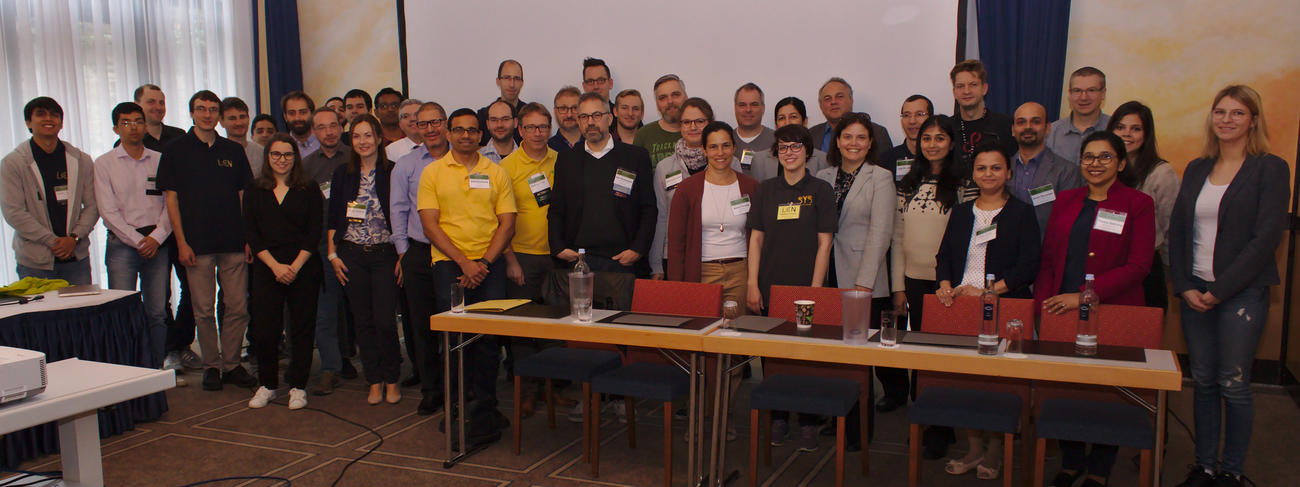Transfer & Outreach
Engagement with Network Operator Community
The Internet Technologies group aims for making its research results available to network operators, hoping that this will help to improve the Internet a little bit. Below you find a selection of talks and blog posts.
We gratefully acknowledge all the support, such as RIPE RACI, that allows us to present our research to the network operator community.
Diversity
We are aware of the impact of cultural bias. We also know that there is no silver bullet to overcome the negative side of such bias.
Our research group tries to improve the situation by first and foremost being aware of the problem. Based on this awareness, we implement direct actions such as establishing a welcoming culture that reflects diversity, justify our decisions transparently, and solicit feedback from those we interact with.
We engage in multiple activities such as Jugend hackt or Networking Networking Women events (e.g., IEEE LCN 2019, IRTF Diversity Travel Grant).
Press
It is important to inform the public based on scientific insights and sound background knowledge. We contribute to this as an expert for media such as ZEIT, Süddeutsche Zeitung, and Deutsche Welle.
Interviews
-
Internetausfall: Kann es nicht nur Facebook, sondern alles ..., Süddeutsche Zeitung, 28.10.2021
-
Mangelnde Digitalisierung im Katastrophenschutz,WirtschaftsWoche, 09.08.2021
-
Glasfaser mitHemmschuh. BerlinerWissenschaftsnetz Brain, Süddeutsche Zeitung, 06.04.2021
-
Revolte im Internet der Dinge, Tagesspiegel, 29.04.2019
-
When hunger for fast Internet collides with U.S. concerns about Chinese spying, The Washington Post, April 23, 2019
-
Hackerangriffe.WarumBürger auf die Zeit ohne Smartphone vorbereitet sein sollten, Berliner Zeitung, February 21, 2019
-
Beat the Prof.Wie funktioniert das Internet?, ZEIT, October 26, 2018
-
We need a new internet, Science Node, August 09, 2017
-
Digitale Vandalen, Frankfurter Rundschau, June 28, 2017
-
Vandalen im Netz. Der jüngste weltweiteAngriff auf Firmencomputer soll offenbar vor allem Chaos verbreiten, Berliner Zeitung, June 29, 2017
-
Cyber-Attacke. Digitale Dilettanten, Frankfurter Rundschau,May 16, 2017
-
In France, a hack falls flat, TheWashington Post,May 8, 2017
-
Zahlen oder nicht? Wie Firmen mit Cyber-Erpressung umgehen sollten, Berliner Zeitung,15.05.2017
-
Arbeitspferdchen. IoT-Betriebssystem RIOT, c’t, number 17, August 2016
-
Internet Society Attracts RecordNumber of Students to IETF 87, IETF Journal, October 2013
-
RPKI: Angst vor einem Staatshack, heise online, 05.08.2013
-
Experten antworten. Zum Thema Bin Raiding, Schwäbische Zeitung, 06.12.2011
-
Web-Überwachung: Neues Internet-Protokoll erschwert anonymes Surfen, SPIEGEL ONLINE, 18.11.2010
-
Internetangriff: US-Kommission wirft China Datenentführung vor, SPIEGELONLINE,17.11.2010
Radio
-
Digitaler Blackout. Wenn dieWelt plötzlich offline ist, Zeitfragen, Deutschlandfunk Kultur, 20.09.2018
-
RIOT soll das offene Betriebssystem für das IoT werden, Computer und Kommunikation, Deutschlandfunk, 20.05.2017
-
Safest – Neue Sicherheit für Menschenmengen?, Logo – Das Wissenschaftsmagazin, NDR Info, 14.03.2014
-
Wer im Internet wohnt. Per Botnet zählen Hacker das Internet aus – natürlich illegal, Breitband – Medien und digitale Kultur, Deutschlandradio Kultur, 30.03.2013
-
GefährlicheNummer –Virenschutz fürsSmartphone, ElektronischeWelten, Deutschlandradio Kultur, 18.09.2012
-
Immunsystem fürSmartphone,Wissenswerte: Forschung im Gespräch, rbb Inforadio, 22.12.2011
-
Schadsoftware auf dem Smartphone –Wie wir unsere Minicomputer vor Viren und Trojanern schützen können,Wissenschaftssendung Leonardo, WDR 5 – Hörfunk, 07.12.2011
TV
-
Living in the Digital Age, Shift, Deutsche Welle, 06.10.2019 (translated in multiple languages) Digitaler Einbruch insSmartHome, Projekt Zukunft–DasWissenschaftsmagazin, Deutsche Welle, 08.03.2019
-
Bin Raiding, hallo deutschland, ZDF, 05.01.2012
-
Bin Raiding: Die unterschätzte Gefahr, WISO, ZDF, 28.11.2011
Research Papers Discussed in the Press (w/o Explicit Interview)
-
Industrial control systems are still vulnerable to malicious cyberattacks, MIT Technology Review, January 28, 2019
-
RIPE-Arbeitsgruppe für das Internet der Dinge. Dinglichkeit, iX, September 2018
-
How the Internet of Things could become a critical part of disaster response,www.itworld.com, July 22, 2014
-
How the Internet of Things Could Aid Disaster Response, shlasdot.org, July 24, 2014
































